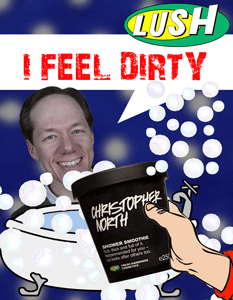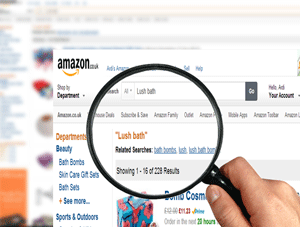 Sales and marketing practices of online retailers selling similar products and services of well-known brands will need to change after the High Court ruled that online giant Amazon can’t use a Google Ad Word of soap and beauty brand Lush to lure customers to its own retail site for alternative products as this amounts to a breach of the Lush trademark.
Sales and marketing practices of online retailers selling similar products and services of well-known brands will need to change after the High Court ruled that online giant Amazon can’t use a Google Ad Word of soap and beauty brand Lush to lure customers to its own retail site for alternative products as this amounts to a breach of the Lush trademark.
Lush has built a brand platform based on its own code of ethics – something which it jealously defends and contends that Amazon doesn’t subscribe to.
As a result, Lush decided it won’t sell its products on the retail giant’s website and probably never will. But that lack of love didn’t deter Amazon from courting customers who want Lush products such as “sex bomb” bath salts and “Prince Charming” shower gel and directing them from its Google Ad Word to alternative products rather than lose the chance of a sale.
Lush founder Mark Constantine, who together with his wife Mo started the company with one shop in Poole, Dorset in 1995 and now have built it into a multi-million business, had tried to settle this clear case of ‘brand hijacking’ issue out-of-court.
“We asked them 17 times before we went to court and after a while you realise you’re being bullied,” he explained. So Lush turned to trademark experts Lewis Silkin and by all accounts the firm can claim a major victory for all brand owners who feel they’re the victims of ‘cyber-bullying’ in much the same way as Lush felt it had been at the hands of Amazon.
The case addressed three specific online sales and marketing activities:
1. Where the consumer typed the word Lush or an expression containing it into a search engine such as Google, prompting an Amazon ad including the word Lush to appear;
2. where a similar search prompting an Amazon ad displayed similar products but not the Lush mark; and
3. where the consumer typed the word Lush (or begins to type Lush) into the search facility on amazon.co.uk web site that resulted in similar products being displayed.
 Deputy Judge John Baldwin QC ruled that there was a clear case of trademark infringement where the consumer types the word Lush or an expression containing it into a search engine such as Google, prompting an Amazon ad including the word Lush to appear and where the consumer types the word Lush (or begins to type Lush) into the search facility on amazon.co.uk that results in similar products being displayed.
Deputy Judge John Baldwin QC ruled that there was a clear case of trademark infringement where the consumer types the word Lush or an expression containing it into a search engine such as Google, prompting an Amazon ad including the word Lush to appear and where the consumer types the word Lush (or begins to type Lush) into the search facility on amazon.co.uk that results in similar products being displayed.
With respect to consumers being directed to other products on its website when they type in the word Lush, the judge said:
“The use complained of by Lush clearly damages the origin function and the advertisement and investment function of the Lush trademark.”
According to the judge, it wasn’t necessary to consider evidence of customer confusion. In its defence, Amazon contended that advances in search engine technology benefited consumers and shouldn’t be constrained by IP rights. But such arguments fell on deaf ears.
“In my judgment, however this right of the public to access technological development doesn’t go so far as to allow a trader such as Amazon to ride rough shod over intellectual property rights, to treat trademarks such as Lush as no more than a generic indication of a class of goods in which the consumer might have an interest.”
The judgment referred to the recent litigation over keywords between Interflora and Marks & Spencer as well as the case between L’Oreal and eBay which are all discussed in detail in Essential Law for Marketers.
The Lush case is a landmark ruling as it’s the first time the courts have ruled that the investment function of a trademark has been infringed by keyword advertising, which is good news for trademark owners.
In many respects it shows that if your brand is associated with characteristics above and beyond the goods and services themselves, there’s an added layer of protection for the trademark which means that ‘look-a-like’ or ‘me too’ competitors can’t “brand hijack” the mark where to do so would damage the investment function.
The European Court of Justice had previously ruled in 2011 that trade mark owners could stop companies using their brands as triggers for ads for competing products if that use substantially interfered with the proprietor’s use of its trademark to “acquire or preserve a reputation capable of attracting a customer and retaining their loyalty” – something which the legal team for Lush strongly argued at the High Court and was accepted by the judge.
 “Lush is a successful business which has built up an image of ethical trading. This is an image which it says it wishes to preserve and it has taken the decision not to allow its goods to be sold on Amazon because of the damage that it perceives there would be to that reputation.
“Lush is a successful business which has built up an image of ethical trading. This is an image which it says it wishes to preserve and it has taken the decision not to allow its goods to be sold on Amazon because of the damage that it perceives there would be to that reputation.
“In my judgment, there’s no material which is sufficient to question the wisdom of Lush’s decision not to permit its goods to be sold on the amazon.co.uk website, particularly bearing in mind they’re rejecting an opportunity which Amazon would contend would lead to an increase in sales of its goods,” observed Judge Baldwin QC.
The judgment clearly distinguishes the situation where the word Lush doesn’t appear in the sponsored ad. Consumers are used to seeing sponsored ads from competing suppliers and in this scenario Amazon is “just another supplier offering similar products” and as a result there’s no trade mark infringement.
The judge also recognised that the mere act of a consumer typing the word Lush into Amazon’s search box can’t be an infringement as Amazon has no control whatsoever over that activity.
However all three specific online sales and marketing activities complained of did amount to trademark infringement. It’s likely that Amazon will appeal against this ruling to the Court of Appeal.
However, if the judgment of the High Court is upheld on appeal, then the ruling will restrict the scope for online retailers like Amazon to use others’ trademarks in situations where they don’t actually have any of those particular brands to sell.
And as a result of this decision, the practice of using brand names in internet advertising to help advertise equivalent or similar products will have to change.
In the meantime, and in a bizarre twist of getting their own back on Amazon, Lush has registered the name of Amazon UK MD Christopher North as a trademark for a new range of toiletries, which could eventually extend to deodorants, hair removing cream and even a range of non-medicated toilet preparations.
Well, if you thought that was a bit bonkers, Lush sued Amazon under its new name “Cosmetic Warriors Ltd”. It’ll be interesting to see whether in the war of words the company manages to win the hearts and minds of a few more eco-friendly consumers. It should, however, remember to keep it clean!














Recent Comments